In-house Agency vs. Outsourcing Digital Marketing
As a veteran digital marketer based in Portland, OR, I’ve seen the world of search engine marketing, social media, analytics and conversion optimization evolve since optimizing my first website in 1996. One of the more prominent trends affecting digital marketing agencies I’ve personally experienced in the last few years is the client’s increasing desire to take search engine optimization (SEO), pay-per-click (PPC) and social media marketing in-house. The trend, while logical, has dangerous implications for corporations and agencies alike.
According to a recent eMarketer study, there are a host of pitfalls to building an in-house digital marketing team. The three greatest disadvantages, according to US marketers, include:
- Staying on top of key trends (internal teams are typically busy fighting fires and don’t have the time or interest to read marketing publications or attend industry events)
- Creative innovation is lacking (creative, innovative types often feel constrained and bored when working for a corporation vs. a dynamic “square-free” agency environment)
- Skill sets of staff is limited (most companies cannot afford seasoned talent)
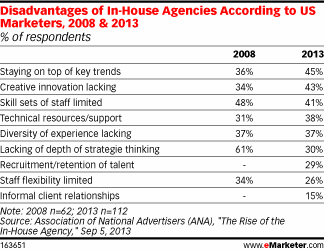
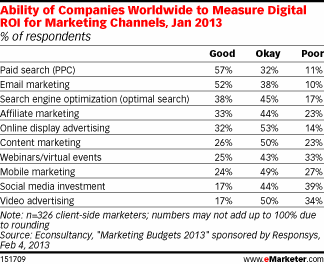
Additionally, in-house agencies typically lack technical depth, diverse experience or ability to think strategically. Interestingly, recruitment and retention has become an issue in the past few years for corporations, as former agency talent has had the opportunity to work in-house and prefers the dynamic agency environment. Corporations are learning what agencies already know: talent is hard to come by and even harder to keep. Whether your company is based in Portland, Seattle or Dallas, you can only throw so many free snacks and monthly massages at a digital marketer used to free beer on tap common at agencies.
Starting at Square One: To Build or Not To Build
As my integrated marketing agency, Anvil Media, enters into its 14th year, one of the greatest challenges we face is competing with aggressive sales teams from competing agencies, as well as the more recent threat of building in-house teams. Historically, our approach has been to help our clients’ build in-house teams and provide frequent strategic consulting, auditing or project support as-needed.
While we know this offering has value, the challenge is to get decision makers to understand the need for third party validation of in-house teams’ efficacy in capturing and analyzing data and acting on strategic insights to create a meaningful return-on-investment (ROI). According to eMarketer, core digital disciplines like SEO and PPC are highly measurable, which means they can be audited and benchmarked. Essentially, we are starting at square one: communicating the value of digital marketing being managed by an agency.
Compounding the need for education of CMOs, VPs and Marketing Directors of the importance of benchmarking and measuring in-house team performance, is the reality that there are serious short-comings of internal teams. According to eMarketer, PPC, SEO and content marketing are three of the four most effective lead generation tactics used by marketers this year. Unfortunately, social media, mobile marketing, SEO and content marketing are four of the most difficult to execute (see below).
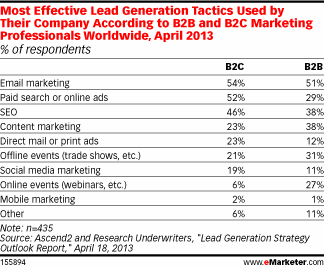
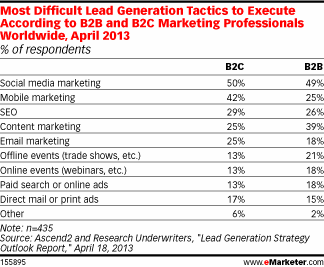
Third Party Validation: Auditing In-House Teams
With so much emphasis on the importance of digital marketing tactics like SEO, PPC and social media in the modern marketing mix, how can corporations not consider third party management, if not validation? How many companies have an outside accounting firm verify financials? Why would critical lead and revenue generation efforts be any less critical? With growing internal marketing teams displacing traditional advertising and marketing agencies (see below), there should be a greater degree of accountability for performance. Who better to validate ROI than third party experts?
In terms of the type of activities companies are currently outsourcing to digital marketing agencies, SEO and online display advertising top the list (see below). Traditional and integrated marketing agencies maintain some job security by managing broadcast and print advertising, but margins and markups continue to compress, if the goal is to hold onto the work.
One of the primary reasons companies do not outsource SEO, display or social media is that they can’t afford it (see Constant Contact chart below). One opportunity for agencies interested in picking up new clients is to educate the companies on the benefits of outsourcing and/or true costs. That, or cut prices, which few agencies can afford to do.
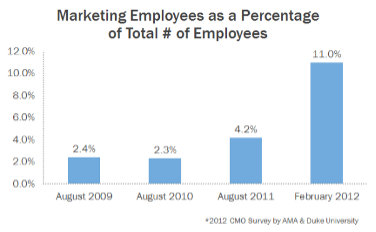
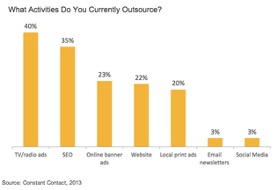
Houston, we have Liftoff
Fortunately, there is hope for digital marketing agencies. According to Constant Contact, 50 percent of companies would prefer to outsource SEO. Corporations would also like to outsource online display, social media and other digital and traditional marketing services (see below).
This provides an opportunity for smart agencies to grow their businesses and meet the needs of a new client base. If you’re on the agency side, how are you communicating the value of outsourcing digital marketing? If you’re on the client-side, what are you doing to shore up your internal investment in an in-house marketing team? You don’t have to start at square one, just make sure you can verify and validate your team is delivering maximum performance. We’re here to help.
Kent Lewis is President & Founder of Anvil Media, Inc., a digital marketing agency specializing in search engine, social media and mobile marketing for clients worldwide. Based in Portland, Anvil was founded in 2000 and services over 50 clients. For more information, visit www.anvilmediainc.com.


